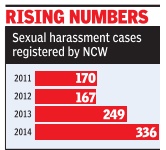Sexual harassment: India
This is a collection of articles archived for the excellence of their content. |
Complaints registered: 2011- 14
Dec 20 2014
Sexual harassment complaints with NCW double in 2 yrs
There has been an over 100% increase in sexual harassment complaints with the National Commission for Women in the last two years. The number of complaints has increased from 167 in 2012 to 336 in 2014 according to government data.
The women and child development ministry (WCD) had enacted the sexual harassment of women at workplace (prevention, prohibition and redressal) act, 2013 which covers all women, irrespective of their age or employment status and protect them against sexual harass ment at workplace both in public and private sector, whether organized or unorganized. There was a 34% increase in registration of complaints in the year after the law was brought. The Commission received 249 complaints related to sexual harassment in 2013. Responding to a question in the Lok Sabha WCD minister Maneka Gandhi said that safety of women were of utmost priority for the Government.“The government is endeavoring to put in place effective mechanisms to provide safe environment for women, she said.
The government has also introduced the Criminal Law (Amendment), Act 2013 has been enacted for making the punishment more stringent for offences like rape. Provision for increased penalty for gang rape and causing injury to the victim resulting her to remain in a vegetative state have been made.
Allegations of sexual abuse may cause suspension in government departments
The Times of India, Jul 18 2015
Bharti Jain
Suspension before inquiry in sexual harassment case?
Govt employees likely to face action before filing of charges
A government employee, facing allegations of sexual harassment at workplace, may be suspended even before filing of the chargesheet if his continuance in office is likely to prejudice the investigations or leads to a scandal, compromising wider public interest.
A DoPT note issued outlining the steps for conduct of inquiry into complaints of sexual harassment in government departments, also provides for initiation of action without inquiry where the charged government servant threatens or intimidates witnesses, disciplinary authority or members of the complaints committee.Such circumstances may exist either before commencement of the inquiry or develop during the course of the inquiry.
As per the procedure prescribed for dealing with com plaints of sexual harassment, a government employee may be placed under suspension before or after filing of the chargesheet where there is apprehension that he may tamper with witnesses or evidence (documents). “Suspension may also be resorted to where continuance of the government servant in office will be against wider public interest such as there is a public scandal and it is necessary to place the government servant under suspension to demonstrate the policy of the government to deal strictly with officers involved in such scandals,“ says the DoPT order.
“It may be desirable to re sort to suspension in case of misdemeanor involving acts of moral turpitude,“ it adds.
As per Sexual Harassment of Women at Workplace (Prevention, Prohibition and Redressal) Act, 2013, every employer, both in the public and private sector, must set up a sexual harassment complaints committee to inquire into such acts reported at workplace. The law provides for transfer of the victim or accused to a different workplace, pending the inquiry, but an accused government employee may also face suspension ahead of being chargesheeted, if the disciplinary authority deems his continuation as prejudicial to the inquiry or against public interest.
Acting tough on an accused who, through or with his associates, tries to intimidate or terrorise witnesses likely to testify against him, the norms empower the disciplinary authority to suspend the inquiry and take action against him without such inquiry . The circumstances leading the disciplinary authority to conclude that it is not reasonably practicable to hold the inquiry include threatening, intimidation or terrorizing of the disciplinary authority , members of the complaints committee, the presenting officer or members of their family .
At the same time, the DoPT has clarified that the “disciplinary authority is not expected to dispense with the inquiry lightly , arbitrarily or with ulterior motive or merely because the case against the government servant is weak“.
To guard against bias on part of the complaints committee during an inquiry , the DoPT norms provide for a stay on the inquiry until the disciplinary authority takes a decision on allegations of bias received. If allegations of bias are established against one member of the panel, the committee may not be allowed to conduct the inquiry .
